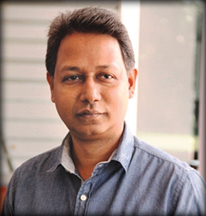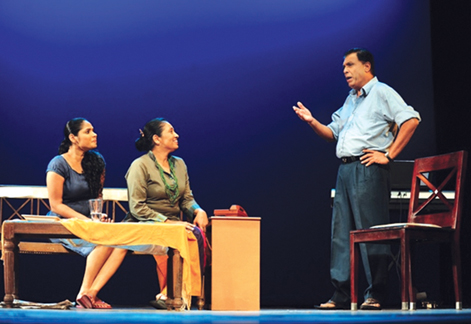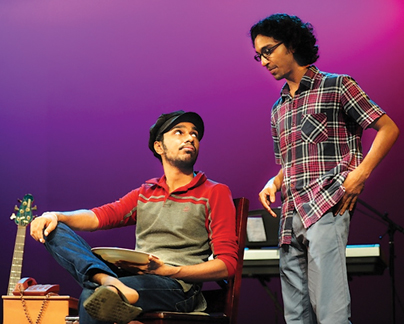|
The Siriwardena Family:
A remarkable triumph
By Dilshan Boange
 |
|
Rajitha Dissanayake |
On January 23 veteran Sinhala dramatist Rajitha Dissanayake offered
what can indubitably said as a story of our times; a critique and
scrutiny of what we now perhaps treat as ‘values’ visible in Sri Lankan
society. Seated in the gentle darkness at the Lionel Wendt that evening
I witnessed Dissanayake’s ‘Siriwardena Paula’ (or as it could be titled
in English as ‘The Siriwardena Family’ on its opening night.
 Dissanayake, is a dramatist who has made a name for himself that
holds ‘signification’ to mainstream theatregoers. He is a dramatist who
clearly addresses the audience through his plays. Dissanayake, is a dramatist who has made a name for himself that
holds ‘signification’ to mainstream theatregoers. He is a dramatist who
clearly addresses the audience through his plays.
He does not do translations of foreign plays, but creates original
plays written by him. He does not pepper his works with showy
intellectual bombardment through neither overdone erudite language nor
‘theoretically experimental’ devices of stagecraft.
His plays are critiques of what can be seen in the climates we
inhabit. As a practitioner of the art of proscenium theatre he is very
comfortable with his chosen domain and knows what his audience would
find engaging in terms of a ‘theatrical critique of about Sri Lankan
society.’
I had absolutely no idea what the premise of the story was about. And
then through the gentle darkness descended after the final bell, there
was an indication of an element of what is contained in the story
–modern Sri Lankan music. It instantly struck a chord in me as what
sounds to be in the likeness of what one hears from a musician as
Indrachapa Liyanage. What I heard is perhaps what may seem as modern Sri
Lankan pop-rock music.
The physical premise of the story is the household of an ordinary
family, the Siriwardenas. The father played by Dayadeva Edirisinghe, is
a pensioner who dearly hopes to see his son –Supun, who has just sat for
the Advanced Level examination, and awaiting results, qualify to read
for a degree in engineering.
The mother, Lalitha, played by Jayani Senenayake, is a school teacher
who has many dreams riding on the abilities of their son as a
vocalist-cum-musician since he has proven he is very likely capable of
reaching ‘stardom’ soon. A stardom perpetrated by television channels
through competitive tournaments in the form of talent search contests
which Sri Lanka has been seeing booming since the last five or six
years.
The entire story unfolds for the viewer in the Siriwardena home,
where ‘change’ in appearances, outlook, aspirations and also furniture,
is propelled at paces that finally show how unsustainable it is to
maintain shimmering facades of ‘development’ which are gambled on
‘investments’ yet to reach fruition.
Getting strung into a credit culture for the ‘thrill of putting on a
show’ can be a disastrous ‘development’ for people who make sudden leaps
outside their known sphere and path to progress. The Siriwardena Family
is a critique of our times in many different ways.
 Even before Supun makes it as a finalist in the ‘Super Mega Star’
contest television show, in which he is believed to be a possible
clincher of the top prize, his mother and elder sister Samanthi begin
flirting with dreams of grandeur. It is an all too common a case of
counting one’s chickens before they are hatched, a scenario which is all
too common to human nature. The play shows how young talent is packaged
and commoditised and thrown into a whirlwind of what seems instant
upward social mobility to new heights. It seemed like young Supun was a
ball thrown into roulette table; he on his own had no single handed says
in how his affairs should be handled in the wake of the glimmers of
provincial fame that grabbed him. And the family itself were made to sit
as unconscious players at a roulette table, not knowing how fate was
playing on their naiveté. Even before Supun makes it as a finalist in the ‘Super Mega Star’
contest television show, in which he is believed to be a possible
clincher of the top prize, his mother and elder sister Samanthi begin
flirting with dreams of grandeur. It is an all too common a case of
counting one’s chickens before they are hatched, a scenario which is all
too common to human nature. The play shows how young talent is packaged
and commoditised and thrown into a whirlwind of what seems instant
upward social mobility to new heights. It seemed like young Supun was a
ball thrown into roulette table; he on his own had no single handed says
in how his affairs should be handled in the wake of the glimmers of
provincial fame that grabbed him. And the family itself were made to sit
as unconscious players at a roulette table, not knowing how fate was
playing on their naiveté.
The play can be acclaimed for the unpretentiousness it offers as a
simple narrative with a deep and timely message for the public. It
mirrors a great deal the ludicrous star status worshipping society that
Sri Lanka is becoming, with some perilous results simmering beneath the
veneer of the jubilance and fanfare. This is a story that must be told.
The Siriwardena Family is Dissanayake’s best yet from what I have so far
watched from his growing body of work.
Hope
Napoleon Bonaparte is believed to have said, “A leader is a dealer in
hope.” And as a schoolboy I still remember in the main hall of Wesley
College at Monday morning assembly how our Principal at the time the
late Dr. N.A.B. Fernando once told us he had read how a human being is
believed to be able to survive enduring starvation up to three weeks,
dehydration up to three days, and deprivation of air for three minutes,
but, he said is unlikely to survive even three seconds if completely
deprived of hope.
Years later on the evening of October 4, 2002, on the day I gave my
most important speech during my school career, I began my words with a
little poem by Oliver Goldsmith which I found especially for the
occasion from the book A Pageant of English Poetry, from my grandfather
Edmund Eramudugolla’s library. It is one that I have come to be rather
fond of.
The poem is as follows –
‘To the last moment of his breath,
On hope, the wretch relies;
And e’en the pang preceding death,
Bids expectation rise.
Hope, like the gleaming taper’s light,
Adorns and cheers our way;
And still as darker grows the night,
Emits a brighter ray.”
Cherished possession
‘Thus said Oliver Goldsmith of what is possibly man’s most cherished
possession’ I said that evening in my speech.
The significance of giving ‘hope’ to the people when all seems lost
is something executive from the TV station in The Siriwardena Family
does masterfully. When tragic circumstances dictate that Supun be
removed from the contest Jayantha puts on the table a new deck of cards,
a new gamble.
This flickers the only possible glimmers of hope for Lalitha who in
her hapless desperation is willing to believe there is hope for them to
get out of the web of problems they have got themselves into by
considering competing in the latest reality talent show –the ‘Super
Spiritual Family’.
Lalitha prepares to buy into the blarney of the new proposition as it
is the only way she can fight the advancing despondency. She needs to
believe there is hope. Mass media, as an industry, has to a great extent
has now become belief creators and hope givers to the public.
The sound voice of reason and old values as portrayed by the father
of the family gets outvoted and set aside from the outset. But it is his
strength of character and determination of spirit within that may
finally offer any real hope for the family as the lights dim to signal
the play’s end.
I am left to wonder if the playwright intended to propose that
today’s Sri Lankan public is at a crossroads where upward social
mobility for people like the family in the play is no longer perceived
as possibly only through what was bestowed as a legacy to the common man
through the efforts of the late C.W.W. Kannangara.
When looking at the overall substance of the story I feel that within
the playwright is a Centre Rightwing voice who while rejecting Far Right
traditionalist dogma does not subscribe to extreme neoliberal policies
either.
Friends can help one to succeed in life or shove one in the path to
damnation. Supun the star to be played by Kasun Chathuranga has two such
notable figures. Lakshitha played articulately by Pasan Ranweera (of
Puswedilla fame) who is the voice of levelheadedness and Ruwan played by
Devinda Wickremasinghe who represents a Sinhala hegemonic outlook which
seems to be presented as an output of the politically populist
patriotism which we have seen in the mainstream public discourse.
But there was a point to his thinking that made him seem to me a
remarkable son of the soil in his disposition of defining what he wants
he believes their ‘platform’ should be in the international sphere.
Identity
He envisions his identity as a musician who will perform to white
westerners (colloquially referred to as ‘Suddho’), not songs in English
but in Sinhala. Ruwan is one who believes that it is possible to create
audiences and listenership for Sinhala songs among non Sinhala speaking
westerners.
For the record it must be noted that Rookantha Gunathilake’s hit song
Diganthaye did make it to the US World Chart Show in the 90s. Ruwan
represents a character who refutes western supremacy over what is
saleable as art to international audiences.
In that grain of Ruwan I see a salutary patriotism seeking a
practicable antithesis to the neo-colonialist domination over popular
art as commodities in a ‘world market’. However grand and patriotically
praiseworthy his young visions may be, all it takes finally is teenage
recklessness, booze and a van on lease, to bring everything crashing
down.
On the performance front I would say that opening night jitters were
visible in several players. The cast was composed of different levels of
stage talent –some seasoned and others relatively new. Dayadeva
Edirisinghe, Jayani Senanayake, Shyam Fernando and Nadeeshani
Peliarachchi delivered their roles commendably.
There were some instances where some players seemed to be not fully
synced with the moment their character is mean to play in. Anuradha
Mallawarachchi’s opening moments onstage as Jayantha is an example.
Wickremasinghe opened his lines greeting Supun’s parents with ‘Good
morning uncle, good morning anti’ (the word ‘anti’ being written here to
represent the common local variant spoken by Sinhala monolinguals for
the English word ‘aunty’) but thereafter, just like every character not
of the Siriwardena household, addressed Lalitha as ‘teacher’.
Thus Wickramasinghe fumbled with his opening says my observations.
The actor who delivered his role most solidly with not even a hair out
of place was Shyam Fernando who appeared towards the end. Also the young
actors who played the roles of Supun and his band must be commended for
their performance as musicians. Apart from the aforesaid actors the cast
comprised of Charindra Chandrasena, Vijith Nuwan, and Thejitha Saubhagya.
The play reaches an end where there is some deep introspective
thought projected by a moment between the father and mother, with some
simple lines which reverberate with meaningfulness.
That spoke much of the playwright’s skill as a person who can bring
to the audience profoundness through simple language ripe with
metaphoric meaning. “Do you see me Lalaitha?” asks the father from his
wife to whom he says to the effect that although people have their
eyelids open their minds are adrift in a form of sleep and afloat with
dreams.
He says how soothing sleep can be to people. This is telling of how
people would opt more for momentary respite than having to face the
drudgery of life and its unending battles.
Escape
Sleep, therefore is a state of escape which offers a momentary sense
of security to the frightened. And when Edirisinghe’s character says
“Ninda digatama thiyaganna one nam, heenayak dakinnama one.” (If, to
make sleep last, it is essential to see a dream.), that was where a
profound statement about human behaviourism is revealed to the viewer
about how we seek solutions through escapism.
A few years ago I read in an interview of Rajitha Dissanayke by
Ruwini Jayawardena in the Daily News in which the playwright stated that
he has no intention of exploring his hand at filmmaking and that he is
dedicated exclusively to theatre.
I would like to urge the playwright of The Siriwardena Family to
reconsider his position and see his latest play as a possible work for
the screen. This is a story that must be told in more than one medium.
It is perhaps a story that the collective subconscious of society
wants to secretly hear, though reluctant to openly grapple with.
Dissanayake now has a great task ahead of him. That is to ensure that
his message in the form of a work of theatre with its ingredients that
appeal to mainstream audiences does its rounds and becomes as watched as
widely as possible. The play is a remarkable triumph.
The Siriwardena Family is a story to be watched by every Sri Lankan. |

